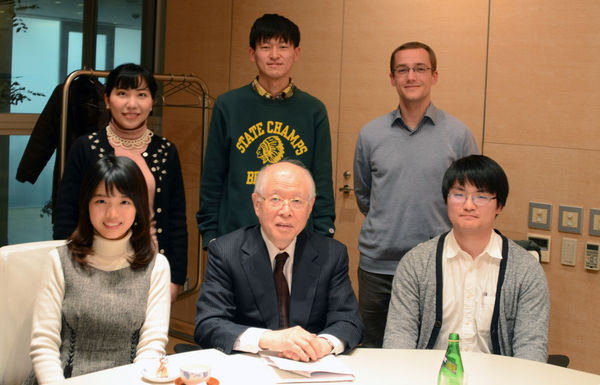Since January 2013, University Prof. Ryoji Noyori, a Nobel Laureate in Chemistry (2001), has contributed numerous articles to "Kamitsubute" in Chunichi Shimbun. Based on these articles, he holds regular academic discussions with students at Nagoya University. At the 24th Noyori Academy Salon, held on February 10, 2017, Prof. Noyori and four students and a researcher from different academic fields at Nagoya University discussed the topic "Japan, to Contribute to Human Existence." Prof. Noyori claimed that a key point that should be encouraged in the 21st century is "collaboration" between countries; in contrast to the era of wars in the 20th century.

Yoshihisa Noguchi, a first-year student at the Graduate School of Bioagricultural Sciences
Regarding world energy issues, I believe that Japanese manufacturing technology is expected to develop energy saving systems because Japan is poor in natural resources.
Prof. Noyori
No country can survive alone. In fact, by means of science and technology, Japan has created valued products from imported raw materials, and then exported them. This is one possible way to achieve mutual cooperation between countries, by providing and receiving beneficial technology for economic development.
Moe Ishida, a first year student at the School of Medicine
The neighboring countries of Japan show dynamic economic growth. On the other hand, I wonder if Japan will register as much growth as it did in the past, or more.
Prof. Noyori
Growth and development are different: growth refers to quantity, while quality is improved with development. Japan, the country with the longest life expectancy in the world, gains much international attention on the improvement of quality of life in such society. It is now time we discussed the happiness of people and the wealth of society so that we can achieve a consensus.
Kazuaki Kato, a first year PhD student at the Graduate School of Education and Human Development
In the “Kamitsubute,” you specifically referred to science and technology for its contribution to solving the world’s issues. What can social scientists, such as myself, do?
Prof. Noyori
Science is certainly important; however, our future concerns me, especially with some of the risks caused by science and technology. We should pursue not only efficiency or profit with science and technology, but also the heart of humanity or spirituality by working together with social scientists.
Jean-Baptiste Durrive, a researcher at the Graduate School of Science
Which is more important, applied research or basic research?
Prof. Noyori
Both are important and I cannot choose either of them. Your basic research on cosmology has also influenced people’s philosophy, which has contributed to the development of cultures.
Hanako Hagio, a first year PhD student at the Graduate School of Bioagricultural Sciences
Thinking of the immigration problem happening in the world, what is your opinion particularly when you consider the disparity in economic power between countries?
Prof. Noyori
We all need to respect each other’s cultures. From this point of view, the concept of being exclusive for immigrants are not acceptable: for example, an especially significant problem is that immigrants are hired as cheap laborers.
Yoshihisa Noguchi, a first year student at the Graduate School of Bioagricultural Sciences
I agree with your meaning of cultural respect. When we admire other cultures, I believe that we will cope with the immigrant problem.
Prof. Noyori
In September 2015, the United Nations adopted its Sustainable Development Goals. Although none of these goals, such as reducing poverty, turned out to be surprising, the important message is that we are asked to accept the diverse values of international cultures. This means these goals need to be achieved through international collaboration.
Original article published in Chunichi Shimbun on February 12, 2017.